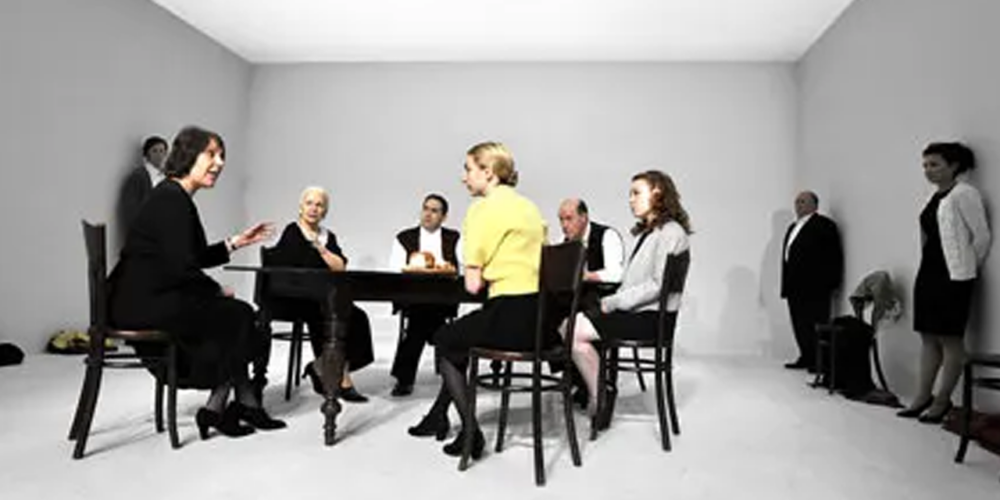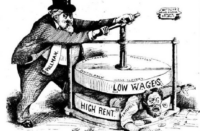In an open letter, 170 British artists reacted angrily to the withdrawal of the European Drama Prize from Caryl Churchill:
We are appalled that the Lifetime Achievement Prize awarded to playwright Caryl Churchill for the European Drama Prize 2022 has been rescinded by the jury of the Schauspiel Stuttgart, on the grounds that Churchill supports the nonviolent Boycott, Divestment and Sanctions (BDS) movement against Israel’s system of apartheid . . . This attack on freedom of conscience is nothing less than modern-day McCarthyism, and raises urgent questions about a pattern of intimidation and silencing in Germany, and beyond . . . The repression and silencing we are witnessing suggest deep seated anti-Palestinian racism, and call into question the integrity and independence of cultural institutions . . . If the only forms of art deemed “safe” for institutions are those that have nothing to say to the dispossessed and oppressed of this earth and that are silent in the face of state-sanctioned repression, then art and culture are emptied of meaning and value.¹
In its statement, the jury had justified the withdrawal of the award not only because of Churchill’s support for BDS but also with her play Seven Jewish Children: A Play for Gaza. She wrote this short text in 2009 after Israel’s attack on Gaza, in which, according to Amnesty, “1,400 Palestinians had been killed, including some 300 children and hundreds of other unarmed civilians, and large areas of Gaza had been razed to the ground.”²
What is this formally unconventional play about, which reads like a poem in free verse? In seven sections of various length one hears the voices of adults advising what may and may not be said to a young daughter.
These answers to a child’s unheard questions are reminiscent of the question-and-answer ritual of the Passover ritual, in which the founding myth of the Jews is passed on to new generations. An ironic arc is created here between this, the persecution of the Jews during the Shoah, and the expulsion of the Palestinians from their homeland. An additional founding myth is written.
Almost all sentences in the play begin with “Tell her” or “Don’t tell her.” Seven sections illuminate the period from the Shoah to the present. The audience quickly grasps which historical situation is referred to. The first section begins: “Tell her it’s a game | Tell her it’s serious | But don’t frighten her | Don’t tell her they’ll kill her.” These lines speak of the utmost tender concern for the child’s psychological as well as physical well-being during fascism.
After the Shoah the concern moves to how to tell the child what happened: “Tell her this is a photograph of her grandmother, her uncles and me | Tell her her uncles died | Don’t tell her they were killed | Tell her they were killed | Don’t frighten her.”
The third section deals with moving to (unnamed) pre-state Israel: “Tell her it’s sunny there | Tell her we’re going home | Tell her it’s the land God gave us.”
The fourth section moves on to the expulsion of the (unnamed) Palestinians: “Don’t tell her home, not home, tell her they’re going away | Don’t tell her they don’t like her | Tell her to be careful. | Don’t tell her who used to live in this house.”
While an uncertain tone prevails in these first four sections, in the very short fifth section there is a new tone, a change in attitude even to the story being told (or not told): the invasion of Gaza: “Tell her we won | Tell her her brother’s a hero | Tell her how big their armies are | Tell her we turned them back | Tell her we’re fighters | Tell her we’ve got new land.”
Greater awareness of an injustice returns in the sixth section. Here at first the “Don’t tell her” sentences—about water, bulldozers (destruction), olive trees, a boy shot dead—dominate, which also express increasing violence against the Palestinians. The “Tell her” sentences of the second half of this section deepen the lies the child is served as her identity: “Tell her we’re stronger | Tell her we’re entitled | Tell her they don’t understand anything except violence | Tell her we want peace | Tell her we’re going swimming.”
The seventh and final section is the longest and surprises us with its transition from free verse to prose, after the expression of doubts as well as fears, for the first time even of passive resistance to militant Zionist positions: “Don’t tell her her cousin refused to serve in the army. | Don’t tell her how many of them have been killed . . . Tell her we’re the iron fist now, tell her it’s the fog of war, tell her we won’t stop killing them till we’re safe, tell her I laughed when I saw the dead policemen, tell her they’re animals living in rubble now, tell her I wouldn’t care if we wiped them out.”
Here the dehumanising of the adult voices and the destruction of the child’s innocence reach their climax. This is somewhat relativised in the last three lines of the play: “Don’t tell her that. | Tell her we love her. | Don’t frighten her.”
Frightened of the adults? The very fact that the girl is asking these questions—and that she has a cousin whose doubts have survived into adulthood—is encouraging. There is hope.
This play, written by Churchill on the occasion of one of the most notorious Israeli attacks on Gaza, is of course not limited to Israel but can be applied to all situations in which parents (or the state, or the state media), aggressors, warmongers, colonisers, enslavers, create a narrative for their children or their people, conceal and transfigure, invent a new story. What is reported? What are you allowed to think, to say? How is history, how is a legend written? Why is the truth so unbearable? Even for the oppressors, who know the truth?
By concealing realities, by not learning from history, oppression and cruelty are born again and again.
In the middle of the sixth section a voice says, “Don’t tell her anything.” The withdrawal of the European Drama Prize to Caryl Churchill is one such effort.
■ Caryl Churchill released Seven Jewish Children as a free download and with free performance rights, with the request that collections be made for the people of Gaza and that the proceeds go to Medical Aid for Palestine.³
1. The full text of the open letter is available at https://tinyurl.com/4rbe8jm8






